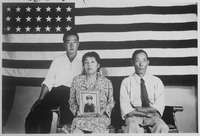When the Emperor was Divine
 The 2003 edition cover | |
| Author | Julie Otsuka |
|---|---|
| Cover artist | Iris Weinstein |
| Country | United States |
| Language | English |
| Genre | Historical fiction |
| Publisher | Alfred A. Knopf |
Publication date | 2002 |
| Pages | 168 |
| ISBN | 978-0-385-72181-3 |
When the Emperor was Divine is a historical fiction novel written by American author Julie Otsuka about a Japanese American family sent to an internment camp in the Utah desert during World War II. The novel, loosely based on the wartime experiences of Otsuka's mother's family,[1] is written through the perspective of four family members, detailing their eviction from California and their time in camp. It is Otsuka's debut novel, and was published in the United States in 2002 by Alfred A. Knopf.
Character List
- Mother: The first section of the novel follows her perspective. She is calm and cool despite the drastic change in her life and ends up becoming the bread winner for her family after the internment camp.
- Daughter: She is 11 years old with long black hair. Daughter is very inquisitive and can easily make friends with strangers.
- Son: He is 8 years old and the one in the family who writes to their father the most. He also fantasizes about the supposed glory of his return more than other characters.
- Father: He is put in an internment camp before the rest of the family. Upon return from the camp he is listless and unable to return to the life he had before.
Plot
When the Emperor was Divine follows an unnamed Japanese American family during World War II, told through perspectives of the four family members over five chapters. The first is told from the mother's perspective as the family is forced to leave their home in Berkeley, California. Chapter two is narrated by the 11-year-old daughter, and depicts the family on a train ride to the Topaz War Relocation Center in Utah. Their eight-year-old son describes their time at Topaz, where the family is held for three years. This chapter shows both children's development; the girl becomes a teen while the boy loses much of his innocence and childish mannerisms. The fourth chapter is told from the reminiscent "we" perspective and depicts the family's struggles upon returning home. They attempt to regain their lives before the war financially and socially. The fifth and final chapter describes the activities of the father, who was arrested by the FBI the day after Pearl Harbor and sent to a more remote and highly guarded "enemy alien" camp in New Mexico.[1][2]
Reception and awards
The book was met with a generally positive reception. Writing for The New York Times, literary critic Michiko Kakutani stated "though the book is flawed by a bluntly didactic conclusion, the earlier pages testify to the author's lyric gifts and narrative poise".[2] Sylvia Santiago of Herizons magazine described Otsuka's writing style as "scrupulously unsentimental", thus "creating a contrast to the sensitive subject matter".[3] O: The Oprah Magazine said the novel was "a meditation on what it means to be loyal to one's country and to one's self, and on the cost and the necessity of remaining brave and human".[4]
When the Emperor was Divine won the American Library Association's Alex Award in 2003 and also won an Asian American Literary Award.[5][6]
References
- 1 2 Niiya, Brian. "When the Emperor Was Divine" Densho Encyclopedia. Retrieved July 1, 2014.
- 1 2 Kakutani, Michiko (September 10, 2002). "Books of the Times; War's Outcasts Dream of Small Pleasures". The New York Times. The New York Times Company. Retrieved June 15, 2012.
- ↑ Santiago, Sylvia (January 1, 2004). "When the emperor was divine". Herizons Magazine. Retrieved June 15, 2012. (subscription required)
- ↑ "Family, interrupted: potent, spare, crystalline–Julie Otsuka's new novel, When the Emperor Was Divine, is an exquisite debut". O: The Oprah Magazine. September 1, 2002. Retrieved June 15, 2012. (subscription required)
- ↑ "2003 Alex Awards". American Library Association. Retrieved June 15, 2012.
- ↑ "'When the Emperor was Divine'... and When Japanese Americans Were Rounded Up". Asia Society. Retrieved June 15, 2012.
